Belgium has gradually become a country that delivers some of the most unique, creative and quality bands within the metal and rock scene. One major player in this, is Amenra and the Church of Ra collective that has spawned many renowned bands over the past decades. Recently, another band heavily linked with that environment emerged under the form of Predatory Void. Created by Lennart Bossu (from Amenra, Living Gate and Oathbreaker) and featuring fellow musicians from bands like Doodseskader, Every Stranger Looks Like You, Amenra, Carnation, Cobra the Impaler and Cross Bringer, just hearing about this collection of artists made us excited. But then they blew us away with the first singles from their debut album ‘Seven Keys to the Discomfort of Being’ (released via Century Media Records in April), and we knew we had to have a bit of a chat with someone of the band. So we set up a Zoom call with vocalist Lina R to talk about how things came together and how it’s been so far…
GRIMM:
Hi! First of all, nice to meet you!
Lina:
Nice to meet you.
GRIMM:
How are you doing today?
Lina:
I’m okay. A little migraine, but it’s fine. I went to hardcore show yesterday in Antwerp. So it was late when I got home.
GRIMM:
Well, we’re basically here to talk about your new band, Predatory Void. I read some things about the project, like the press releases and stuff. But since there hasn’t been like, major interviews published yet (at least not back when we had the talk), or anything that I’ve seen so far. Could you just shortly go over how you guys got together?
Lina:
Yeah, so Lennart (Bossu, guitars) normally tells this part. But we did it so many times already. So I remember what he said. So basically, he started writing the material during lockdowns when he couldn’t do shows with any of his bands.
And the material he was writing, in his opinion, just didn’t fit like Amenra or Oathbreaker. And he was thinking, like, maybe I should try and find some people to start a new band and see where it goes. And he knows Thijs (de Cloedt; guitars) for like 20 years, something like that. And he plays together with Tim (De Gieter; bass).
And my band released an album in 2020, with Cross Bringer. So he heard the record, and he was like, “Oh, but she lives like, almost next door. Maybe I should ask her to do the vocals.” And when he sent me the demos, I was like… I was really impressed. And I immediately wanted to join.
And then Vincent (Verstrepen; drums) was the latest addition to the lineup. And then when we met, it just clicked, and it’s actually really good. (laughs)
GRIMM:
Well, that’s a good start at least, that it really clicks.
It was also kind of interesting to see that you guys had an interesting journey, so to say. Because you guys got together, you made music. And then without releasing anything at all, you just went at it and played your first show. Which is kind of a unique approach.
I just thought it was a really, really interesting way to go. How was the experience to do it that way, basically be an as good as unknown band and just throw your stuff out there live?
Lina:
Well, I feel like with all of us, it doesn’t feel like a new band, because we’ve all had projects in the past, or we still play in other bands. So in our case, I think we were just thinking like, “We should start doing shows because like we were just rehearsing every two weeks, and we’re not gonna play anywhere else except for the rehearsal space”.
And Lennart just talked to the people from Soulcrusher (festival in the Netherlands). And he just threw it out there. Like, “Maybe if you’re interested in booking us, just let us know” and then they did.
And it was stressful. The first time. But it was really nice. I think it brought us together even more. But yeah, he just approached… he knows some people. So I feel like it wasn’t too difficult with the track record of like each individual member. So yeah, I think we have a bit of like an advantage or something.
GRIMM:
I guess a little bit since a lot of people from the band come kind of from that, Church of Ra/Consouling Sounds kind of collective.
Lina:
Exactly. So that’s how it happened. And then with Roadburn, it was almost the same. He sent the album to the people responsible for Roadburn. And yeah, they immediately were like, super enthusiastic. And it’s, I mean it’s really cool. And at the same time very scary for me personally, because I’m used to only playing like squats and small clubs. A bit surreal. (laughs)
GRIMM:
Yeah, I can imagine. Like, playing like that first show, for instance. It seems to me like an interesting mixture of playing with not really any expectations from people checking you out. But at the same time, since everyone comes from well known, established bands that there’s actually expectation.
Lina:
Yeah, so we were kind of caught between two things. But in the end… we were trying to be like, super chill about it.
Like, “Well, no one knows the material. So we’ll just see how that goes.”
But people were super enthusiastic, they approached us, after the set, everyone was very positive. So I guess it works.
GRIMM:
Now, I saw in the press release that you mentioned a couple of inspirations, like sort of a reference of where you guys come from. But I was kind of wondering, for you personally, what your inspirations are, either vocally or then going into the lyrical part of everything?
Lina:
Um, actually, I tried to steer clear of any references in that regard. Because I feel like your vision can get very clouded. I noticed, like as a tattoo artist myself, for example, if I look at someone’s work too much, I start replicating their elements a lot. And that’s also something I tried to escape.
So regarding me, I feel like I just go for general vibes of certain albums or songs, and then I listen to them a lot. And they kind of like imprint on me, I feel like. And then from there, I derive associations that I write down.
But basically lyrics wise I mostly, think, and overthink. (laughs) And then that becomes like the basis for everything. And I write compulsively, so I could be just going to a store, and then I’ll get like, a couple of lyrics in my head, and then I have to write it down immediately. Otherwise, I’ll lose it. And sometimes if it’s like some kind of… I wouldn’t say traumatic event, but something in that area, that really touches me. I kind of need to also write it down to live through it and close the door on it. And so I just write compulsively all the time, and then I have like snippets.
So I don’t know if I lyrically get inspired by anything or anyone specifically. I feel like it’s just a mix of everything I see and feel and experience. And then I just tried to make it sound and nice and relatable.
And then vocally… when I was a child and I sang in a choir and had guitar lessons, and I had to sing. My teachers always said like, don’t try to emulate anyone, just find your own voice and develop it. And like when you hear metal vocalists, everyone is doing several techniques as well. So you can’t always know how exactly they approach things. And then working with coaches, working with, you know, people who can help you achieve a certain level, it’s not accessible to everyone, I guess. So people want to sound like someone like the Lamb of God vocalist, for example, and then just can’t because you don’t have the same voice, like speaking voice. You don’t have as much experience, you don’t have the tools.
So I just tried to do my own thing, honestly. The way I can and like, that’s what we got, and we’re gonna work with it.
GRIMM:
Yeah, makes total sense.
And going further on that vocal part a little bit. From what I read, being in this band has kind of pushed you a little bit to kind of experiment, so to say, with your vocals, go into a different direction than what you’re used to.
I was just curious how big of a challenge that was for you, going for the more vulnerable singing and stuff like that. And how challenging it is for you to do that kind of singing live.
Lina:
Yeah, that’s a good question. Well, I’ve done clean vocals before. Also, I played bass and I did like a role in musical theater for several years here in Belgium… And then I had to sing clean. And I had to do a shitload of shows. So I was like, “I guess that’s what we’re doing”.
But then when we went to write the album… Of course, in my head, I like structure. So I was like, “Yeah, it’s like a metal album. So I’m gonna fucking scream.” And Tim was like, “No, no, no, this is gonna be too much, it’s gonna be like a huge sandwich, no one’s gonna swallow. So we really need to try and do some variations.”
And so he was just like, pitching ideas. Tim is great in that regard. He listens to like completely different music. And so he really understands how the structures within songs work. Otherwise, I would have just yelled, like, screams everywhere. But he really helped to transform the lyrics into like, more… I feel like they have more meaning now that they are very different. And like this energy and vibe…
GRIMM:
I feel like on the album, when you listen to it, it’s nice to have those kind of highs and lows, so to say. There’s something different going on so there’s like a flow in there. Because then, quite often, it makes the screams stand out more and the cleans stand out more, they highlight each other that way.
Lina:
Yeah. It’s all about the dynamic, I think. Like now, after recording this, I was like, “Ooooh”. (laughs)
I really started, I think I really started listening more carefully to the music I listen to normally.
GRIMM:
It feels like it tells more of a story…
Lina:
It’s just a tone, like in a conversation. You can also have like tones when you’re trying to spit everything out and tell something and then you kind of stop, or you sit in silence. You know, I feel like that’s kind of like a very expressive monologue in the songs.
Doing it live is challenging. (laughs) Because like head banging, and then like, “Haaaa” (harmonizes). Doing this is a challenge still, and we haven’t done many live shows, so I’ll have to work on it a lot. Presentation wise and getting everything like on pitch and stuff like that. But so far, in rehearsing I don’t have any trouble. But like with rehearsing, you don’t move. So yeah, that’s, I guess a challenge. But I think with the stage experience is gonna get better. My promise to everyone is, it’s gonna get better. (laughs)
GRIMM:
I feel that it’s a very, very interesting and well-made debut album. I listened to it a couple of times now already, and it really sticks with me. So let’s hope it does the same with everyone else that listens to it.
It makes me wonder what would you kind of hope people would get out of the album, so to say, when listening to it.
Lina:
I think the most important part for me is that it feels relatable in some sense. That maybe someone can find themselves, like struggling with the same stuff. And understand that it’s actually okay to accept things that are very heavy and live with it or get over it.
Yeah, I think relatability is the biggest one for me. Because I was writing it also from the point of complete honesty and openness. I hope to be understood. (laughs) No, it’s a joke.
But yeah, I want it to be relatable. If people enjoy it, and like they read the lyrics also next to listening to music. And then they understand like, “Oh, okay, there is more to it than just chaotic stuff, aggressive stuff”. Yeah, I think I want it to be a dialogue more than a monologue after it gets released. You know?
GRIMM:
I actually did myself kind of read through the lyrics while listening to the music. And I found some of your lyrics, in a way straightforward and understandable. But at the same time, I was personally kind of impressed with the poetic nature of them. Some of the things the way you said them, I found it kind of beautiful, I guess.
Lina:
Oh, thank you. That’s nice.
GRIMM:
And it really fits with this kind of music. Because on the one hand, it’s chaotic, but it’s also melancholic. I really like what you guys are doing.
So, as you said earlier, you guys are really clicking and, from what I’m hearing now, it feels like the whole band is a very kind of organic thing. Very collaborative. And I feel like you really hear it in the end product.
Lina:
Perfect. Yeah, I really feel good with the guys. Because coming in, I only knew Lennart but also, I never knew him like well enough. So I was like, “Is it gonna be awkward?”
It’s like, it’s kind of hard for me to meet new people. Because I either like shut down completely. Or I start talking, and then it’s like they want to run away, but they’re too polite to do it.
With the band, we’re really invested in each other. We click, we delegate, we communicate,.. Even when there are some parts we don’t agree on, it doesn’t become like, “Oh, f you” and stuff like that. It’s really like, “Okay, how can we approach this? So that most of us are okay with it.” Yeah, it’s just, it’s kind of great, honestly.
GRIMM:
I guess that’s a really good way to start a band…
Lina:
Yeah. And I feel like we’re all at an age… We’re either almost 30 or way above 30. And we’re genuine. We’re just not trying to play a role anymore. It’s just organic because we’re taking people as they are. And we are being ourselves, so that’s the most important thing.
GRIMM:
Just trying to create music…
Lina:
Yeah, exactly.
GRIMM:
Alright, we’re about there. Is there anything you’d like to add still to wrap this up?
Lina:
I’m not sure. I just want to thank you for calling me and for willing to do this. We really appreciate it.
GRIMM:
Alright, looking forward to hopefully catch you live some time. Lots of luck with the release and your upcoming shows!
Lina:
Yeah, thank you so much! See you around, bye!
Go check out their debut album ‘Seven Keys to the Discomfort of Being’ and catch them live at Alcatraz Festival this summer or their fall/winter tour later this year!
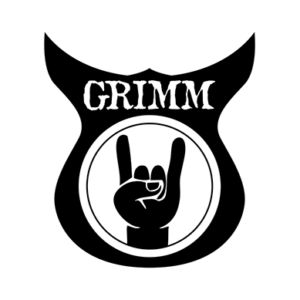
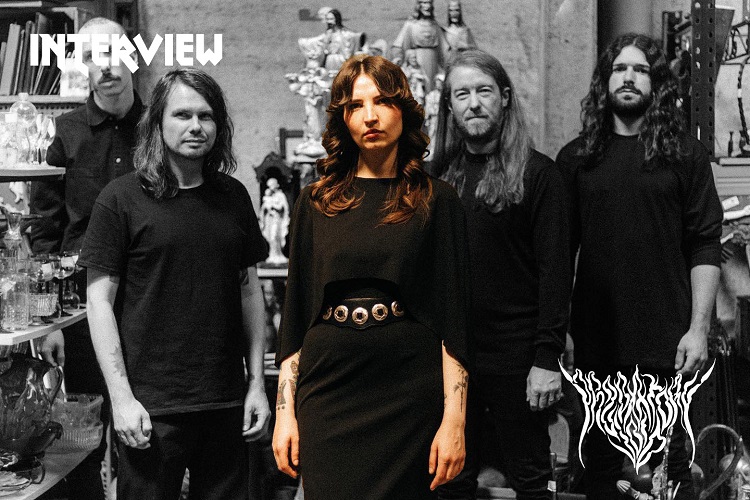
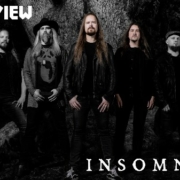
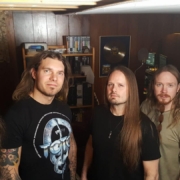
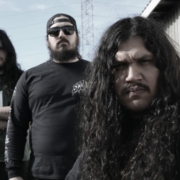
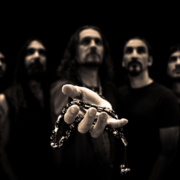
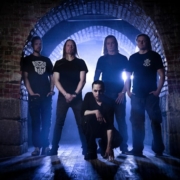
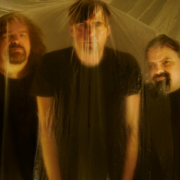




Leave a Reply
Want to join the discussion?Feel free to contribute!